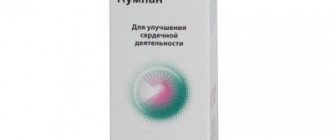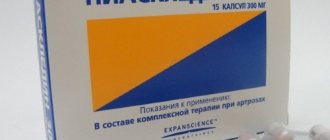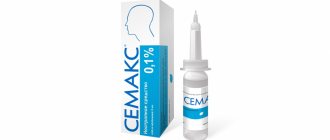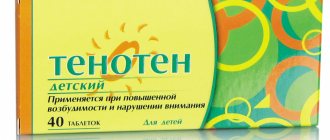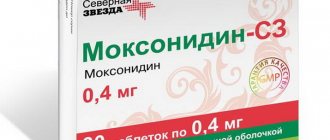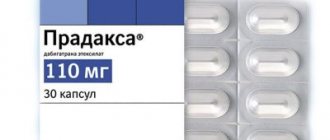For the treatment and prevention of heart and vascular diseases, a modern drug, Cardiomagnyl, was created based on acetylsalicylic acid.
The main purpose is to prevent thrombus formation and blockage of blood vessels with blood clots, to prevent heart attacks and strokes.
What is Cardiomagnyl used for?
This medicine helps prevent the development of thrombosis and related complications in people with diseases of the cardiovascular system. Active substance of the drug: acetylsalicylic acid (aspirin). NSAIDs with a pronounced antiplatelet effect prevent platelet adhesion and the formation of blood clots, improve blood fluidity. Magnesium hydroxide in the composition blocks the toxic effects of acetylsalicylic acid on mucous membranes.
In industry, Cardiomagnyl is produced in two dosages:
- white heart-shaped tablets: each contains 75 mg of aspirin and 15.2 magnesium;
- Cardiomagnyl Forte: round-oval scored pills, 150 mg of acetylsalicylic acid and 30.39 mg of magnesium each.
Form-forming and auxiliary substances of the drug: talc, starch, MCC and others.
Regular use of the medicine prevents platelet aggregation and the deposition of blood clots in blood vessels.
Features of application
This drug is dispensed from pharmacies without a doctor's prescription. Sometimes patients purchase it on the advice of friends, but before taking it they inattentively study the instructions for use. Reviews of Cardiomagnyl show that some people are mistaken about its properties. Therefore, they leave negative feedback, calling it ineffective. This happens because such patients consider it a drug for the treatment of cardiovascular diseases. It is used for angina pectoris, hypertension, arrhythmia and does not obtain the expected effect. In fact, Cardiomagnyl is a remedy that only prevents complications from such pathologies. It cannot replace cardioprotectors, diuretics or vasodilators. In addition, it is not a source of magnesium, although it contains this substance.
How does Cardiomagnyl work?
ASA (aspirin) in the composition of the drug is quickly absorbed from the gastrointestinal tract and blocks the main mediators that regulate platelet aggregation. Being present in the bloodstream, acid prevents excessive thickening and the formation of blood clots. Magnesium salt acts as a protector, protecting mucous membranes from irritation.
The active substance Cardiomagnyl is metabolized in the liver and intestines. Acetylsalicylic acid does not accumulate in the body. In the absence of severe damage to internal organs, salicylates are eliminated without causing harm.
Contraindications to its use
Even when a doctor prescribes a drug, it is advisable to carefully study its instructions. Reviews of Cardiomagnyl note that it is well tolerated, but not all patients can take it. There are certain contraindications, in the presence of which the drug will not help, but, on the contrary, will worsen the patient’s condition. First of all, this is a blood clotting disorder and a tendency to bleed. The cause of this condition may be hemorrhagic diathesis, lack of vitamin K or potassium, or the presence of a stomach ulcer. This is due to the ability of acetylsalicylic acid to thin the blood. In addition, this substance can provoke bronchospasm, so patients with bronchial asthma should not take Cardiomagnyl either.
Reviews from doctors note that there are several other categories of patients to whom this drug is not prescribed:
- children under 18 years of age;
- pregnant women, especially in the 1st and 3rd trimester;
- women during lactation;
- people with kidney failure;
- patients with intolerance to acetylsalicylic acid;
- people with gout;
- patients with cerebral hemorrhage.
In what cases should you take Cardiomagnyl?
The medicine is prescribed to prevent complications in the following pathologies:
- risk of developing myocardial infarction;
- condition after a heart attack;
- chronic cardiac ischemia;
- diabetes;
- hypertonic disease;
- atherosclerosis, high cholesterol;
- risk of thrombosis with varicose veins.
Cardiomagnyl is unable to replace drugs for lowering blood pressure, does not regulate heart rhythm and has no effect on the general course of the disease. Its function is to prevent the development of thrombosis. The drug is also not used as a source of magnesium.
Indications for use of the drug "Cardiomagnyl"
Judging by the name of the drug, it should be used in the treatment of heart pathologies. But this assumption is refuted by doctors and instructions for use. Reviews from cardiologists about Cardiomagnyl note that it is effective for preventing complications of such pathologies. It is prescribed mainly to those patients who have a high risk of blood clots. If the patient does not have a predisposition to this process, the use of Cardiomagnyl is not advisable. Reviews from doctors note that it is best to prescribe it in the following cases:
- after heart surgery, for example, coronary bypass surgery;
- patients with diabetes or obesity;
- To old people;
- in the complex treatment of hypertension, angina pectoris, acute heart failure;
- with coronary heart disease;
- after myocardial infarction;
- people with bad habits.
When Cardiomagnyl is contraindicated
The prohibition on the use of the drug in therapy includes:
- childhood;
- individual intolerance to any of the components;
- exacerbation of peptic ulcer;
- severe renal failure;
- history of angioedema or other allergic reactions to aspirin;
- decompensation of heart failure;
- bronchial asthma;
- vitamin K deficiency, impaired hematopoietic function.
Contraindications and side effects
The use of Cardiomagnyl must be approved by a doctor, since the drug has serious contraindications:
- excessive sensitivity to aspirin or any other component;
- intolerance to non-steroidal anti-inflammatory drugs;
- acute period of erosive and ulcerative lesions of the gastrointestinal tract;
- hemorrhagic stroke;
- predisposition to bleeding;
- bronchial asthma provoked by the use of NSAIDs or salicylic acid derivatives;
- gastrointestinal bleeding;
- severe kidney dysfunction;
- deficiency of the enzyme glucose-6-phosphate dehydrogenase;
- taking with the antitumor drug Methotrexate (in an amount of more than 15 mg per week);
- I and III trimesters of pregnancy, breastfeeding.
Prescribed with caution for gout, in the second trimester of pregnancy, with an increase in the amount of urate in the blood, ulcers and bleeding of the gastrointestinal tract in the past, dysfunction of the liver and kidneys, allergic conditions, bronchial asthma.
The following side effects were identified:
- nettle rash;
- angioedema;
- discomfort in the stomach - heartburn, ulcerative lesions of the gastric epithelium, bleeding, nausea, abdominal pain;
- intestinal irritation, inflammation of the colon mucosa;
- inflammation of the mucous membrane of the esophagus or oral cavity;
- bronchospasms;
- headache, sleep disturbances or drowsiness, dizziness;
- the appearance of bleeding, a decrease in hemoglobin levels, a critical decrease in platelet levels, a decrease in the number of neutrophils in the blood.
What are the dangers of an overdose of Cardiomagnyl?
The maximum daily dose of the drug is 150 mg. Exceeding it will lead to serious intoxication of the body:
- impaired coordination of movements;
- sweating;
- hearing loss, dizziness;
- lowering blood pressure;
- nausea and vomiting.
Acute poisoning is fraught with vascular collapse, loss of consciousness, respiratory disorders, and liver failure. Assistance in case of an overdose of Cardiomagnyl after gastric lavage should be provided by medical specialists.
Possible side effects
Reviews of Cardiomagnyl note that, unlike Aspirin, it has fewer side effects. They are much less common and less pronounced. Basically, the negative properties of the drug appear when it is taken without taking into account contraindications or when the dosage prescribed by the doctor is not followed. The following side effects may occur:
- heartburn, nausea or vomiting;
- damage to the gastric mucosa, pain and discomfort;
- formation of ulcers on the gastrointestinal mucosa and in the oral cavity;
- bleeding in the digestive tract;
- allergic reactions, from urticaria to bronchospasm;
- tinnitus, dizziness;
- sleep disturbance;
- headache.
Reviews
On the forums there are conflicting responses about the effectiveness of the medication. In most cases, patients are satisfied with the results obtained. Negative reviews are associated with the occurrence of symptoms of drug intolerance and allergies. Not everyone is happy with the cost of the pills.
Doctors consider the drug to be quite good and capable of achieving its goals. They focus on the fact that most of the body’s negative responses to procedures are caused by violations of the rules of application.
Instructions for use "Cardiomagnyl"
This drug can only be used as prescribed by a doctor. In this case, it is necessary to strictly follow its instructions and instructions. Reviews of Cardiomagnyl note that if all recommendations are followed, the drug is well tolerated and begins to act quickly. People like the fact that this product is easy to use. You only need to take the tablet in the prescribed dosage once a day. It is best to do this in the evening, after the last meal. You can swallow the tablet whole or crush it. Then you need to drink the medicine with water. Cardiomagnyl is not a drug for one-time use; it is taken in courses. The duration of treatment is determined by the doctor. Moreover, in some cases it can be very long-term, up to lifelong use of the drug.
Analogues of "Cardiomagnyl"
Reviews of the use of acetylsalicylic acid for the prevention of thrombosis note that this substance works best. Based on it, several drugs have been created for use for this purpose. These are “Aspirin Cardio”, “Akard”, “Reocard”, “Ekolin”, “Trombo ACC”, “Acecardol” and others. But these analogues of Cardiomagnyl receive not only positive reviews, as they more often cause side effects. Therefore, it is not advisable to replace the drug prescribed by the doctor with them.
There are also analogues of the drug that do not contain acetylsalicylic acid. They have the same effect as Cardiomagnyl, but are based on other active ingredients. This could be Clopidogrel, Trental, Pradaxa, Curantil, Trombopol. They also prevent the formation of blood clots, so if you are intolerant to Cardiomagnyl, it is better to use its analogues.
special instructions
Despite the fact that this drug is considered non-toxic and is taken to prevent complications of cardiovascular diseases, it should not be used without the recommendation of a doctor. Do not exceed the recommended dosage, as this increases the risk of bleeding and damage to the mucous membrane of the digestive tract. It should also be taken into account that during the course of treatment with Cardiomagnyl you should not take alcoholic beverages and certain medications. And due to the possibility of side effects from the nervous system, it is not advisable to undergo such treatment if you need to operate a car or other dangerous mechanisms. Therefore, before taking this drug, you should definitely read the instructions for use.
